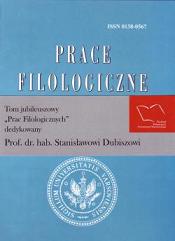Czy żebym mógł powiedzieć, że ktoś obraził X-a, X musi poczuć się obrażony? (i inne pytania o czasownik {obrażać / obrazić})
If I am to say that somebody offended X, is it necessary that X felt offended? (and other questions about the verb {obrażać / obrazić})
Author(s): Izabela Duraj-NowosielskaSubject(s): Language and Literature Studies
Published by: Wydział Polonistyki Uniwersytetu Warszawskiego
Keywords: czasownik ‘obrażać/obrazić’ kogoś; struktura tematyczno-rematyczna; cechy semantyczne i składniowe; jednostki języka; the verb “to offend somebody” { imperf. / perf.}; thematic-rhematic structure; semantic and syntactic features; (bilateral) units of l
Summary/Abstract: In the article I discuss semantic and syntactic features of the verb obrażać / obrazić kogoś [“to offend somebody”, imperf. / perf.], as they depend on the aspect and the form of the subject (i.e. cos´ - “something” or ktoś - “somebody”). I applied a series of implicational tests checking two kinds of implications for the expressions in concern (2 aspects x 2 forms of the subject): (a) “causal” implications - (whether) something / somebody c a u s e d something, i.e. caused that X f e e l s offended (“subjectively”) or that X wa s offended (“objectively”, as it is judged by the speaker), possibly without feeling offended; and (b) “intentional” implications (only for ktoś - subjects) - (whether) somebody i n t e n d e d to offend X, possibly without actually offending him in the above sense, subjective or objective. Another feature taken into account is intonation viewed as a manifestation of neutral thematic-rhematic structure of sentences built on these predicates (the latter being an important semantic feature of predicates themselves). On the grounds of these characteristics I distinguished five (bilateral) units of language, only one of which implying that X actually felt offended.
Journal: Prace Filologiczne
- Issue Year: 2007
- Issue No: 53
- Page Range: 173-182
- Page Count: 10
- Language: Polish

